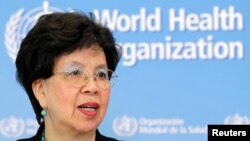The World Health Organization said work is moving ahead on a plan to reform the organization’s ability to respond speedily and effectively to international health emergencies.
The reforms were triggered by worldwide criticism of the WHO’s slow response to the Ebola epidemic in West Africa.
The WHO’s Director-General Margaret Chan did not declare Ebola an international public health emergency until August 8, 2014, more than four months after Guinea had declared Ebola a national health emergency.
The deadly virus subsequently spread to Sierra Leone and Liberia, killing nearly 1,000 people in the region by the time WHO responded.
Chan said WHO will be implementing reforms in six main areas.
“First, the development of a unified program for emergency. … Internally, ... we are implementing faster, more streamlined internal procedures for procurement, for staff deployment and the management of our global resources to speed up the response to any emergency," Chan said.
'Seeing the results'
"We are already seeing the results of this streamlining in our response to outbreaks and emergencies in Yemen, Nepal and the Republic of Korea," she added.
WHO said it also plans to help countries create resilient health systems. It will establish a global health emergency workforce that can quickly respond to international health emergencies.
Chan said a fourth area of work is aimed at enhancing the implementation of the International Health Regulations.
“By this, I mean developing a mechanism to sound the alarm earlier and determining whether this is a way -- I mean there is a way to create mechanisms … incentives for countries to report outbreaks early," she said.
Chan said WHO will continue research and development of vaccines and treatments of current and emerging diseases.
She said implementing these reforms will be costly, but she said she is confident the money will be found.




